4 Causes of Blue Smoke From Exhaust (and How to Fix)
Maybe you’ve seen it: accelerating from a stoplight, a car ahead is spewing a bunch of blue-colored smoke from the tailpipe. It’s not extreme, like a smoke bomb, but it also isn’t normal like everyone else’s exhaust smoke.
Or maybe you experience blue smoke coming from your engine bay upon startup every morning, no matter the weather.
Let’s look at what’s causing the blue smoke coming out of your exhaust and how much it’s going to cost to fix.
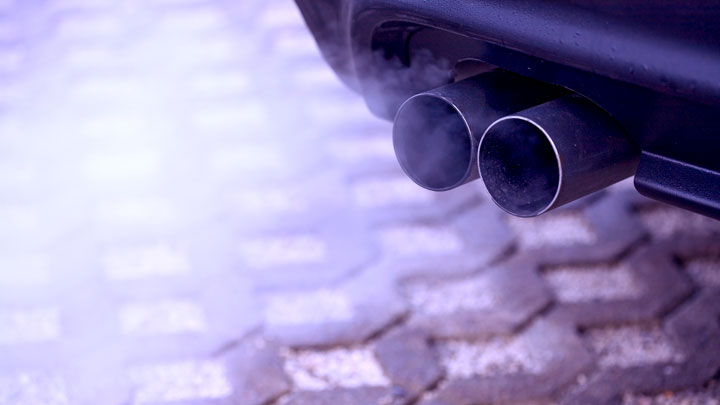
See Also: 5 Causes of White Smoke From Your Exhaust
What Does Blue Smoke Mean?
Blue smoke means oil has mixed with your gas in the combustion cycle, and that oil is being burned up and sent out your exhaust pipe with the rest of the partially burned fuel.
It means your car is being inefficient in its operation and the causes should be explored as soon as possible. Generally, the oil is leaking out due to a gasket that isn’t making a proper seal, which means you still have some time.
If the blue smoke is being caused by oil mixing with your gas in the combustion chamber, then the issue is more serious.
Reasons Your Car is Blowing Blue Smoke
#1 – Oil is Dripping Onto the Headers
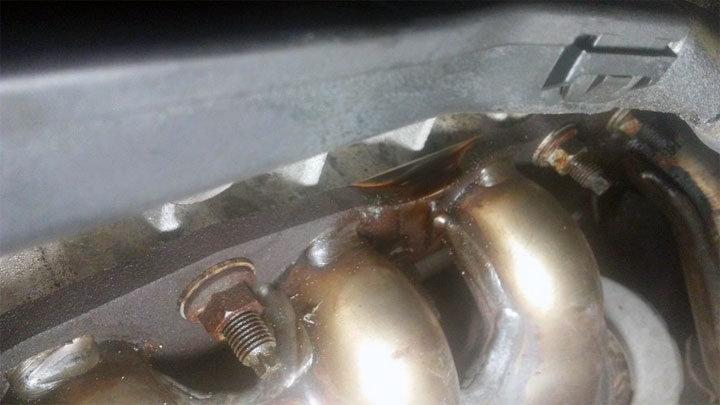
As mentioned above, oil can escape from the gasket between your engine block and the head and drip onto the hot exhaust parts of your drivetrain. This will cause blue smoke to appear and it will be quite smelly.
You may notice some blue smoke from the back of your car as you accelerate, or while you are idling.
I remember a classic scenario when looking at a 2002 Mitsubishi Montero. The owner stated that she had the head gasket replaced, but then after a short test drive you can smell the oil burning and seeping from that very same gasket that she said was fixed.
A lot of times, if the head gasket is bad, the cylinder head needs to be replaced, and the only reason your head gasket needs to be replaced is because the head got so hot that it warped and now allows oil to seep through that gap.
Related: Cracked Cylinder Head Repair Cost
#2 – Oil is Mixing With Fuel
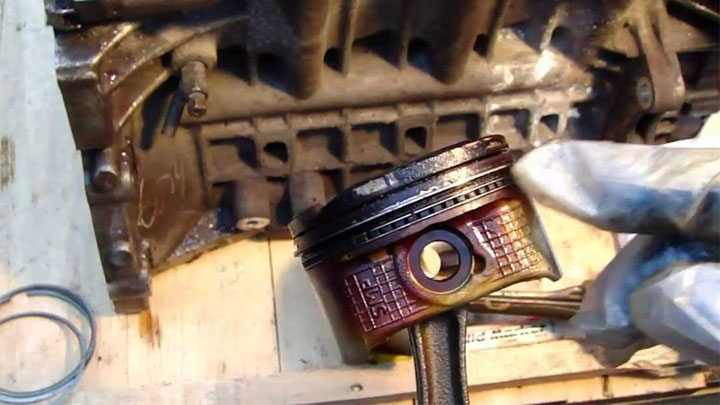
Now, back to blue smoke. The valve seals, piston rings, and PCV valves in your car will not last forever. And if you run your car 10,000 miles between oil changes, the oil will be less efficient at reducing friction in your motor.
This means more heat will be generated in the engine, which will heat and cool the gaskets, causing them to dry and crack.
Dry and cracked valve seals are not effective at keeping fluids separate, so you may find your oil mixes with your fuel and the oil by product will end up getting burned as well in the combustion chamber.
This means, while you used to only see gray smoke exiting the tailpipe on a normal day, you will now see some blue smoke coming out of the exhaust system. If the piston rings are worn out, you’ll need to replace your engine.
If this blue smoke has only started appearing after an oil change, then you may have just put too much oil in. This will cause the oil to froth up and decrease its efficiency in dealing with lubrication and heat. Just drain out the excess oil and start over.
#3 – Oil is Dripping Onto Hot Engine Parts
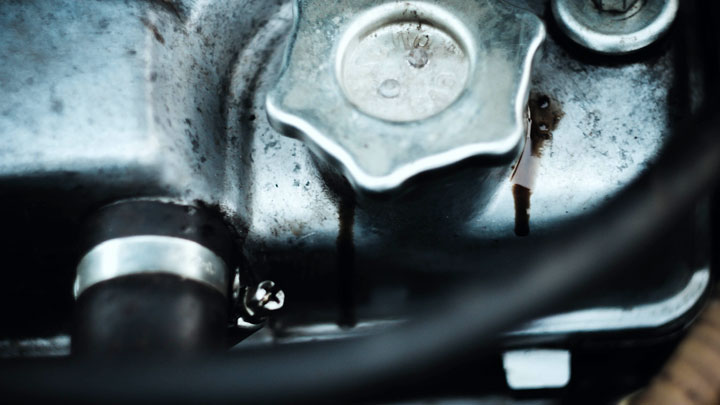
Another scenario is this: Your head gasket or valve cover gasket goes bad, and your engine is leaking a bit of oil. That oil will drip onto the other hot parts of your engine bay (like your headers) and then evaporate in a cloud of blue smoke.
This smoke will come out from under your hood at idle, then the back of your car as you are driving down the road. This is another reason why you should always pay attention to the smells coming from your vehicle.
Does it smell like something is burning? Was that smell there before? Did someone leave a cheeseburger in the glovebox? Ask yourself questions like this.
See Also: 6 Reasons Oil is Dripping Out of Your Tailpipe
#4 – Bad Glow Plugs (Diesel Engines)
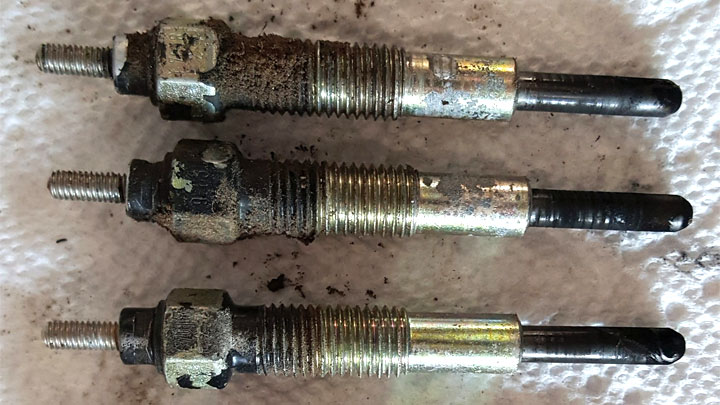
If you notice that blue or black smoke is coming from your diesel car or truck upon startup, your glow plugs are probably bad. This means your car will not be able to start normally and you may notice a longer than normal cranking time.
To test if the problem stems from your glow plugs, connect a 12 volt test light to your positive batter terminal. Then, connect the wire one by one to each of your glow plugs to see if you get a reading.
Replacing these could cost anywhere from $100-$500 depending on whether you do it yourself or have a reputable shop complete the service for you, so it’s worthwhile to make sure they are bad before you sign up for that chunk of change.
Should You Still Drive With Blue Smoke From Your Tailpipe?
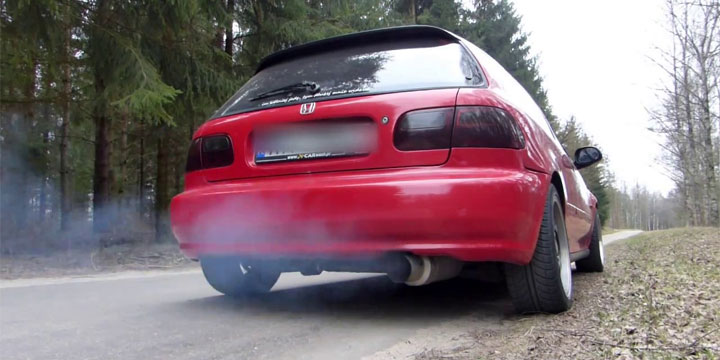
You can still drive with blue smoke coming from your tailpipe, but as with all of our recommendations, you should get your car to a qualified mechanic as soon as possible. This is because oil mixing with your fuel is not a good thing to happen, and it’s not how your engine was designed to run.
If your piston rings are worn out, and the car is high mileage, you will need to replace your engine which could cost anywhere from $2500-$7000 which is not money you will want to spend.
You don’t want to have to replace your engine, so get that issue checked out the moment you start to see blue smoke as you may be able to just replace those piston rings and run the car for a couple more years.
What If You Have Blue Smoke at Startup and Then It Goes Away?
Seeing some blue smoke emit from the exhaust pipe during initial cold engine startup is fairly common in older, high mileage vehicles. However, excessive levels of blue smoke that takes a long time to dissipate likely signals worn internal components.
This blue smoke specifically points to oil getting past aged cylinder pistons and rings and making its way into the combustion chambers.
At cold temperatures, the small gaps in between the pistons and chamber walls allow more oil to sneak past. But as the engine warms up and the components thermally expand, the gaps tighten up and the oil consumption/blue smoke gets reduced.
The Cost of Fixing your Blue Smoke Problem
Basically, you will need to replace your glow plug, head gasket, valve seals, piston rings, or PCV valve depending on what the problem’s source is.
If you are handy with a wrench, and you have the hours (and spare car) to devote to fixing this issue, a valve seal only costs $40 so this could be a pretty cheap fix if you have the time.
If you aren’t that handy with a wrench, the part will probably cost $80 from a shop, then factor in $500 +/- for labor. It’s pretty expensive, but cheaper than a totaled car or a new engine!
That’s where the hard part is. If you have bad piston rings, you’ll need to replace your engine most likely. This is a very expensive job and it could cost $7000 or more.
If your car is relatively new, that should be covered under the powertrain warranty so make sure you ask the dealership first. If it’s an old used car that’s worth more than it costs to replace the engine, you may have to bite your tongue and bring out that checkbook.
For most people, and insurance companies, replacing the engine is a totaled car so that may be where this story of the fabled blue smoke ends.
Drifting With Your Buddies
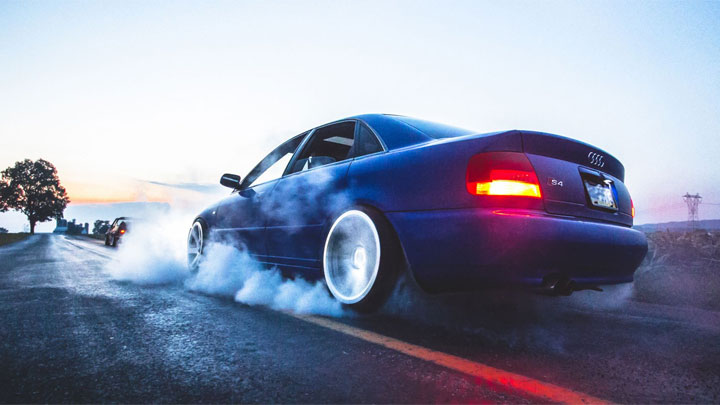
If you somehow find out that the blue smoke is NOT coming from your piston rings, valve seals, head gasket, PCV valve, or your bad glow plugs, and you are drifting on a track with your eyes burning from blue smoke up ahead, then there’s a chance the person in front of you got those fancy tires that create colored smoke when they burn up! How cool is that?
- How Long Does Paint Protection Film Really Last? - Apr 23, 2024
- How to Reduce Wind Noise in Your Car (Locate the Source) - Nov 22, 2023
- How Long Can You Drive on a Spare Tire? (and How Fast Can You Go?) - Sep 13, 2023

Good read thanks.
2019 QX60 Infinity 50k miles. Mine happens after a 30-40 minute trip. When I come to a stop at the end of the trip a plume of blue smoke pours out and takes a minute or so to burn off completely. Doesn’t happen with typical around town driving. Heading to shop to have checked out tomorrow.
Could the oil have been overfilled the last time it was serviced?
Hi, i see small blue smoke out of my exhaust when i start the car but later disappear,what might be the cause
It sounds like a bit of oil burning off when you first start the car. This is just a guess, but you could have a small oil leak somewhere that seeps into the combustion chamber while the car is parked. If you really wanted to get to the bottom of the issue, I think a leak down test would give you a better idea of what’s going on.
If the car otherwise drives okay and the problem doesn’t get worse, I personally wouldn’t worry about it much if it were my car. I have a car that blows a bit of extra smoke under certain conditions and it runs just fine.